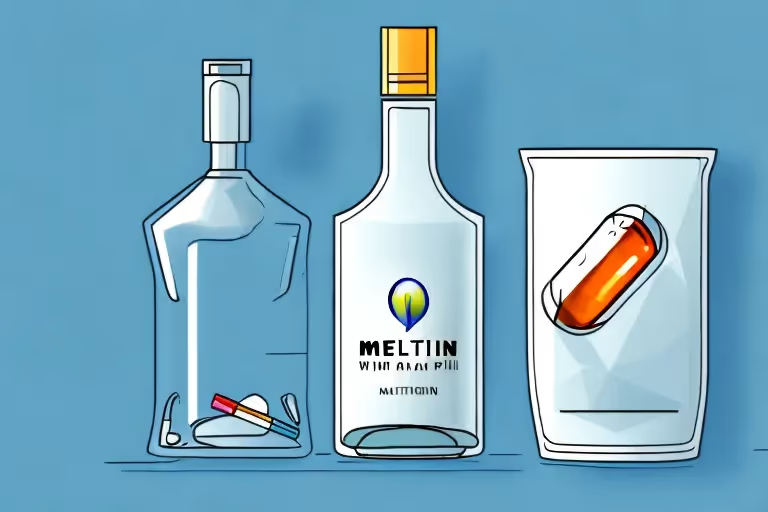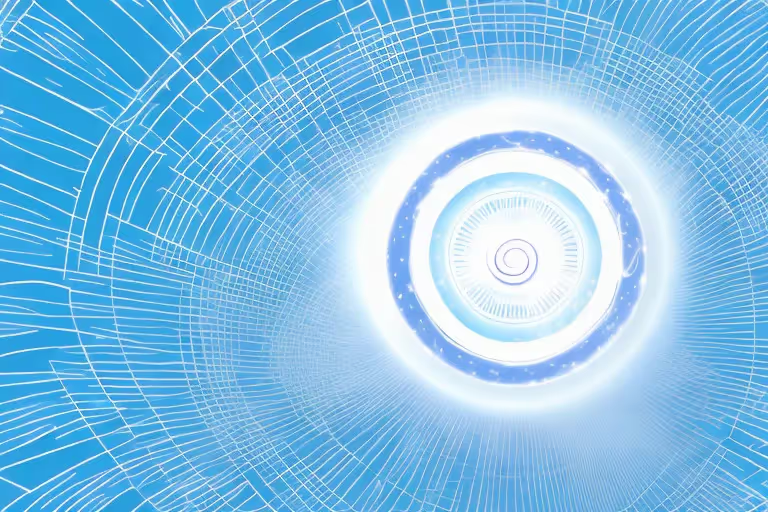In today's fast-paced world, a good night's sleep can sometimes feel like a luxury. Many people turn to various methods to help them relax and unwind, and two popular choices are melatonin and alcohol. But what happens when you mix these two substances? Are there any potential risks or benefits to be aware of? In this article, we will dive into the effects of mixing melatonin and alcohol, exploring their individual functions, the impact they have on the body, the science behind their interaction, case studies and research findings, as well as important safety considerations and recommendations.
Understanding Melatonin and Its Functions
What is Melatonin?
Melatonin is a hormone that is naturally produced by the pineal gland in our brains. It plays a crucial role in regulating our sleep-wake cycles, also known as our circadian rhythm. Typically, melatonin levels start to rise in the late evening, remain high throughout the night, and then drop in the early hours of the morning, signaling our bodies that it's time to wake up.
But did you know that melatonin is not only involved in sleep regulation? This hormone has a wide range of functions that go beyond just helping us fall asleep and wake up. Let's explore some of the lesser-known roles of melatonin in our body.
Firstly, melatonin is a powerful antioxidant. It helps protect our cells from damage caused by harmful free radicals, which can contribute to aging and various diseases. By scavenging these free radicals, melatonin helps to maintain the overall health and integrity of our cells.
In addition to its antioxidant properties, melatonin also plays a role in immune system function. It helps regulate the activity of certain immune cells, such as T cells and natural killer cells, which are essential for fighting off infections and diseases. By modulating immune responses, melatonin helps to keep our immune system in balance and functioning optimally.
The Role of Melatonin in Sleep Regulation
When melatonin levels are low, it can be difficult to fall asleep and stay asleep throughout the night. This is one of the reasons why melatonin is often used as a sleep aid by individuals who struggle with insomnia or jet lag. By taking melatonin as a supplement, it can help regulate sleep patterns and promote a more restful night's sleep.
But how exactly does melatonin regulate our sleep? Well, it acts as a signal to our brain that it's time to sleep. When melatonin levels rise in the evening, it triggers a cascade of events that promote relaxation and sleepiness. It helps to decrease body temperature, reduce alertness, and increase drowsiness, all of which contribute to a smooth transition into sleep.
In addition to its sleep-promoting effects, melatonin also helps to regulate our internal body clock. This clock, located in the suprachiasmatic nucleus of the brain, controls our daily rhythms and helps us synchronize with the external environment. By influencing the timing and duration of sleep, melatonin helps to keep our circadian rhythm in balance.
It's worth noting that melatonin production is influenced by external factors, such as exposure to light. Bright light, especially blue light emitted by electronic devices, can suppress melatonin production and disrupt our sleep-wake cycles. This is why it's recommended to limit screen time before bed and create a dark and relaxing sleep environment to enhance melatonin production.
In conclusion, melatonin is not just a hormone that helps us fall asleep. It has a multitude of functions, including antioxidant activity and immune system regulation. By understanding the various roles of melatonin, we can appreciate its importance in maintaining our overall health and well-being.
The Impact of Alcohol on the Body
Short-term Effects of Alcohol
Alcohol is a central nervous system depressant, meaning it slows down brain activity. In small doses, it can produce feelings of relaxation and euphoria. However, as the amount of alcohol consumed increases, it can have a sedative effect, making it more difficult to stay awake and alert. Additionally, alcohol can impair coordination, judgment, and memory, and it can also contribute to poor decision-making.
Long-term Effects of Alcohol
While moderate alcohol consumption may not have immediate detrimental effects, excessive and prolonged alcohol use can lead to serious health problems. Long-term alcohol abuse has been linked to liver damage, cardiovascular issues, and an increased risk of certain types of cancer. It can also negatively impact mental health, leading to depression, anxiety, and memory impairments.
The Science Behind Mixing Melatonin and Alcohol
Immediate Effects of Mixing Melatonin and Alcohol
While melatonin and alcohol may both have sedative effects on their own, combining them can intensify these effects. When taken together, melatonin and alcohol can increase drowsiness, impair motor skills, and lead to a more profound and longer-lasting relaxation. This can be particularly problematic if a person needs to be alert or engage in activities that require concentration, such as driving.
Potential Long-term Consequences
There is limited research on the long-term effects of regularly mixing melatonin and alcohol. However, it is important to consider that excessive alcohol consumption can have serious health implications on its own. Regularly relying on both substances to sleep may indicate an underlying sleep disorder or other health concerns that should be addressed with the help of a healthcare professional.
Case Studies and Research Findings
Recent Studies on Melatonin and Alcohol Interaction
A growing body of research has shed some light on the effects of mixing melatonin and alcohol. A study published in the journal Sleep Medicine found that combining the two substances increased the time it took for participants to fall asleep and reduced overall sleep quality. Another study in the journal Alcoholism: Clinical and Experimental Research revealed that mixing melatonin and alcohol increased the risk of experiencing vivid and distressing dreams.
Personal Experiences and Testimonials
While research provides valuable insights, personal experiences can also offer perspective. Many individuals have reported feeling excessively drowsy, experiencing next-day drowsiness, and having difficulty waking up after mixing melatonin and alcohol. It is important to remember that everyone's reaction to substances can vary, and what works for one person may not work for another.
Safety Considerations and Recommendations
When to Avoid Mixing Melatonin and Alcohol
It is generally advisable to avoid mixing melatonin and alcohol, especially if you have important responsibilities or need to remain alert. If you are taking any prescription medications, it is essential to consult with your healthcare provider before combining melatonin and alcohol, as certain medications may interact negatively with alcohol. Furthermore, individuals with certain medical conditions, such as liver disease or sleep apnea, should exercise caution when considering mixing these substances.
Safe Alternatives for Sleep Aid
If you are struggling with sleep difficulties and are looking for alternatives to help you relax and improve the quality of your sleep, there are several options to consider. Some natural alternatives include establishing a consistent sleep routine, creating a relaxing bedtime environment, practicing relaxation techniques, and engaging in regular exercise. If these methods do not provide sufficient improvement, it is recommended to consult with a healthcare professional who can offer personalized guidance and potential treatment options.
Overall, it is crucial to prioritize your health and well-being when seeking ways to improve your sleep. While melatonin and alcohol may seem like tempting solutions, their potential risks and interactions warrant caution. To ensure you are making informed decisions, speak with a healthcare professional who can provide expert guidance tailored to your specific needs.
At Aura Health, we understand the importance of finding effective sleep solutions. Our Aura Health App offers a range of science-based techniques and programs designed to help you unwind, relax, and improve your sleep naturally. Through guided meditations, soothing sounds, and personalized sleep assessments, we are committed to helping you achieve optimal rest and well-being. Download the Aura Health App today and unlock your potential for rejuvenating sleep.
Aura is Your All In One App for Meditation, Mindfulness Wellbeing
Find peace every day with one app for your whole well-being. There is no one-size-fits-all solution to mental well-being. Aura is the first all-in-one wellness app that learns how to best help you. Discover an endless library of expert-created tracks for your well-being, all taught by the world’s best coaches, therapists, and storytellers. With Aura's personalized recommendations, you can find peace every morning, day and night.



.webp)






.avif)

%20(1).avif)


.avif)
.avif)
.webp)


.avif)


















































































































.avif)

















.svg)









